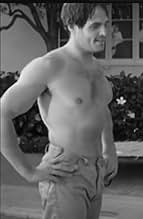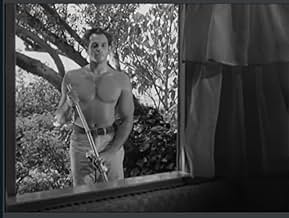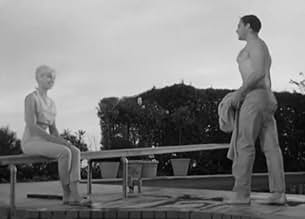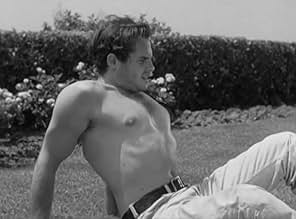IMDb RATING
6.7/10
1.5K
YOUR RATING
An arrogant criminal offers to seduce a woman for his dim, sexually inexperienced partner.An arrogant criminal offers to seduce a woman for his dim, sexually inexperienced partner.An arrogant criminal offers to seduce a woman for his dim, sexually inexperienced partner.
- Director
- Writer
- All cast & crew
- Production, box office & more at IMDbPro
6.71.4K
1
2
3
4
5
6
7
8
9
10
Featured reviews
Classic?
Two drifters become obsessed with and annoy a frustrated house wife in the Hollywood hills until things become dangerous. This feels like most indie movies today that are a few people in a house and then some stuff happens, so I wasn't suprised to see that it's being remade.
This was scandalous in the 50s and even earned an X rating in the UK. It's mostly innocuous, but it does have a very dark ending with some implied things. Overall, I'm not sure it's the "lost classic" as I've read and really dosnt need a modern remake. I guess it was way ahead of its time, but I generally don't really like the films it's way ahead of. Fortunately, it's only 80 minutes and the last 10 minutes was great.
Watched on Kanopy.
This was scandalous in the 50s and even earned an X rating in the UK. It's mostly innocuous, but it does have a very dark ending with some implied things. Overall, I'm not sure it's the "lost classic" as I've read and really dosnt need a modern remake. I guess it was way ahead of its time, but I generally don't really like the films it's way ahead of. Fortunately, it's only 80 minutes and the last 10 minutes was great.
Watched on Kanopy.
A Psycho-Sexual Thrill Ride from 1960
This legendary, presumed lost film is now available is very good print on blu-ray and DVD. Was it worth the wait? I'd say yes. PRIVATE PROPERTY is artfully photographed and has a very capable cast who give convincing performances. The film is short and to the point: a crime thriller with some subtext, that holds a viewer's interest and sustains plenty of tension. It's not some lost masterpiece, but an accomplished minor film that is somewhat ahead of its time in frankness about some sexual matters.
Corey Allen (Duke), Warren Oates (Boots) play drifters who have apparently just met. Duke is the stronger personality and clearly a manipulating sociopath. He dominates Boots, promising a sexual initiation with a beautiful suburban housewife Ann (Kate Manx). The men have followed Ann to her home by way of nearly car-jacking another driver (Hollywood veteran Jerome Cowan). They hole up in an unoccupied house next door and watch Ann as she swims and sunbathes. All the while, Duke stokes Boots' sexual frustration. It's never clear just how much Boots actually wants Ann. He's clearly under Duke's spell, and soon Ann will be as well. Once Ann's husband leaves on a business trip the film kicks into high gear. There is a nice, moody, late-50s feeling to much of this film, especially in the scenes set inside Ann's home. But unlike most films of the era, PRIVATE PROPERTY has a frankness about sexual matters and sociopathy. Possibly only PSYCHO or PEEPING TOM (both also released in 1960) dared to openly portray violent sexual deviancy in similar ways. PRIVATE PROPERTY is nowhere near those films, artistically speaking, but it's still pretty strong stuff to watch. Leslie Steven's direction is economical and well paced. Thanks to Ted D. McCord, the film has an attractive look, occasionally resembling TV drama from the period. Pete Rugolo's score adds a lot to the atmosphere. Best of all are the actors. Manx is very affecting and it's too bad she did not appear in more films. Corey Allen (always underrated, even after a well- remembered sequence in REBEL WITHOUT A CAUSE) gives the strongest performance. He's very adept at playing on the other characters' weaknesses to achieve his own ends. And Warren Oates at the beginning of his career is a standout as the weak-willed, sexually conflicted Boots. It's great to finally have this film in such a terrific edition.
Corey Allen (Duke), Warren Oates (Boots) play drifters who have apparently just met. Duke is the stronger personality and clearly a manipulating sociopath. He dominates Boots, promising a sexual initiation with a beautiful suburban housewife Ann (Kate Manx). The men have followed Ann to her home by way of nearly car-jacking another driver (Hollywood veteran Jerome Cowan). They hole up in an unoccupied house next door and watch Ann as she swims and sunbathes. All the while, Duke stokes Boots' sexual frustration. It's never clear just how much Boots actually wants Ann. He's clearly under Duke's spell, and soon Ann will be as well. Once Ann's husband leaves on a business trip the film kicks into high gear. There is a nice, moody, late-50s feeling to much of this film, especially in the scenes set inside Ann's home. But unlike most films of the era, PRIVATE PROPERTY has a frankness about sexual matters and sociopathy. Possibly only PSYCHO or PEEPING TOM (both also released in 1960) dared to openly portray violent sexual deviancy in similar ways. PRIVATE PROPERTY is nowhere near those films, artistically speaking, but it's still pretty strong stuff to watch. Leslie Steven's direction is economical and well paced. Thanks to Ted D. McCord, the film has an attractive look, occasionally resembling TV drama from the period. Pete Rugolo's score adds a lot to the atmosphere. Best of all are the actors. Manx is very affecting and it's too bad she did not appear in more films. Corey Allen (always underrated, even after a well- remembered sequence in REBEL WITHOUT A CAUSE) gives the strongest performance. He's very adept at playing on the other characters' weaknesses to achieve his own ends. And Warren Oates at the beginning of his career is a standout as the weak-willed, sexually conflicted Boots. It's great to finally have this film in such a terrific edition.
An Uncovered Gem
Duke (Corey Allen) and Boots (Warren Oates), two young thugs, hold up a California gas-station owner. Duke, virile and savage, taunts the slower and psychologically-confused Boots because he has never made a sexual conquest.
This film came about due to press agent Stanley Colbert, who hoped to move Leslie Stevens from Broadway (where he was a playwright) to Hollywood. Along the way, Colbert introduced Sevens to Kate Manx, and they were soon wed. The three combined birthed Daystar Productions, and with it, "Private Property".
The hiring of the camera crew happened by accident, and was fortuitous; the picture looks great. Colbert hired a nobody, Conrad Hall. And Hall brought with him a minor legend: Ted McCord, a veteran of "East of Eden" and "Treasure of Sierra Madre", as well as scores of others. Hall today is better known than McCord, as he went on to great things over the next three decades -- not only as a regular under Stevens on "Outer Limits", but as the cinematographer for such classics as "Cool Hand Luke" and "American Beauty".
How long has this film been buried? Apparently it had become largely lost and forgotten because it couldn't get a production seal in America. Today, the film is tame, but apparently not then. Making a profit in Europe before disappearing, in 2016 it was recovered and given the proper Blu-ray treatment. If nothing else, it deserves this for the names involved: Leslie Stevens (creator of "The Outer Limits"), Corey Allen ("Rebel Without a Cause" and Warren Oates ("Dillinger"). These three men had only just begun in 1960, but were each soon giants in their own way.
But it also stands on its own as an interesting crime film. Part home invasion story, part "Without Warning", and part "Of Mice and Men", it is hard to categorize. Not quite film noir, but still something different. It almost evokes the feeling of a BBS film, something independent that might have been more at home in the 1970s. Coupled with strong performances from the three leads, it is worth tracking down. There is an unusual exchange between Manx and Allen when he reveals that he has been squatting next door that has to be seen to be believed, it is so hypnotic.
The Blu-ray's greatest feature is the film itself, but it also has some highly informative liner notes and an 18-minute interview with photographer Alexander Singer. Singer covers a wide range of topics, from his time on Kubrick's "Killer's Kiss", to the more technical explanations of "softening" the lens and how it has been accomplished over the years.
This film came about due to press agent Stanley Colbert, who hoped to move Leslie Stevens from Broadway (where he was a playwright) to Hollywood. Along the way, Colbert introduced Sevens to Kate Manx, and they were soon wed. The three combined birthed Daystar Productions, and with it, "Private Property".
The hiring of the camera crew happened by accident, and was fortuitous; the picture looks great. Colbert hired a nobody, Conrad Hall. And Hall brought with him a minor legend: Ted McCord, a veteran of "East of Eden" and "Treasure of Sierra Madre", as well as scores of others. Hall today is better known than McCord, as he went on to great things over the next three decades -- not only as a regular under Stevens on "Outer Limits", but as the cinematographer for such classics as "Cool Hand Luke" and "American Beauty".
How long has this film been buried? Apparently it had become largely lost and forgotten because it couldn't get a production seal in America. Today, the film is tame, but apparently not then. Making a profit in Europe before disappearing, in 2016 it was recovered and given the proper Blu-ray treatment. If nothing else, it deserves this for the names involved: Leslie Stevens (creator of "The Outer Limits"), Corey Allen ("Rebel Without a Cause" and Warren Oates ("Dillinger"). These three men had only just begun in 1960, but were each soon giants in their own way.
But it also stands on its own as an interesting crime film. Part home invasion story, part "Without Warning", and part "Of Mice and Men", it is hard to categorize. Not quite film noir, but still something different. It almost evokes the feeling of a BBS film, something independent that might have been more at home in the 1970s. Coupled with strong performances from the three leads, it is worth tracking down. There is an unusual exchange between Manx and Allen when he reveals that he has been squatting next door that has to be seen to be believed, it is so hypnotic.
The Blu-ray's greatest feature is the film itself, but it also has some highly informative liner notes and an 18-minute interview with photographer Alexander Singer. Singer covers a wide range of topics, from his time on Kubrick's "Killer's Kiss", to the more technical explanations of "softening" the lens and how it has been accomplished over the years.
A View From 2022
It wouldn't be fair for me to rate this 1959 flick. On one hand, it has historical significance since it was one of the first movies denied release by American censors who found it forbidden fruit. On the other hand, as entertainment, I found the 79-minutes unfortunately too talky and boring to endorse. Hence, it doesn't seem fair to choose between the two poles.
The flick starts off well enough, at a filling station where two seedy drifters, Duke and Boots, look to fill their empty lives by pursuing a wealthy blonde for seduction purposes. Now that's a promising start, but from there on, except for the brief ending, the narrative flattens out into a basically one-note affair. After all, how long does it take wily Duke to infiltrate blonde Ann's hilltop mansion where she usually lives alone, her businessman husband out making money. Then too, it's a stretch that wealthy hubby would leave her alone without household help.
Thus, it appears budget constraints flatten the main storyline into a series of hilltop one-on-one talk-fests. Sure, Duke wants to insinuate himself into Ann's life by pretending to be a gardener. But needed suspense in his manuevers is sorely lacking. Still and all, the hilltop setting does furnish a good scenic view of greater LA that kept me watching.
All in all, it looks like the indie effort was a well-intended effort to escape the bonds of 50's studio productions held captive by a strict censorship code. But what might have been cutting edge then, seems banal now when much looser public standards prevail.
My advice: if you're looking for more than mainly talky flatlining, skip it. But if you're interested in former forbidden fruit grab it and bite.
The flick starts off well enough, at a filling station where two seedy drifters, Duke and Boots, look to fill their empty lives by pursuing a wealthy blonde for seduction purposes. Now that's a promising start, but from there on, except for the brief ending, the narrative flattens out into a basically one-note affair. After all, how long does it take wily Duke to infiltrate blonde Ann's hilltop mansion where she usually lives alone, her businessman husband out making money. Then too, it's a stretch that wealthy hubby would leave her alone without household help.
Thus, it appears budget constraints flatten the main storyline into a series of hilltop one-on-one talk-fests. Sure, Duke wants to insinuate himself into Ann's life by pretending to be a gardener. But needed suspense in his manuevers is sorely lacking. Still and all, the hilltop setting does furnish a good scenic view of greater LA that kept me watching.
All in all, it looks like the indie effort was a well-intended effort to escape the bonds of 50's studio productions held captive by a strict censorship code. But what might have been cutting edge then, seems banal now when much looser public standards prevail.
My advice: if you're looking for more than mainly talky flatlining, skip it. But if you're interested in former forbidden fruit grab it and bite.
This is a very frightening scenario that I am sure has played out in the California suburbs many times before and since
Although this film is supposedly a fictional drama, I believe there are literally hundreds (if not thousands) of lonely and attractive housewives all across North America who can relate to the scenes played out in the film Private Property. We have all heard that phrase before of "playful and innocent enough flirting or sexual teasing". And we have also heard the phrase "No means No" in countless drama films which are played out in both an actual and/or a fictitious court of law.
This film draws a very fine line between some tense criminal and very real sexual assault activity that is hard to watch and a very good dramatic simulated performance played out by all four (4) of the film stars. The female lead played by Kate Manx as the lonely suburban California housewife who was ignored by her business executive husband appreciated the attention bestowed upon her by the aggressive stranger who showered her with compliments as well as many lies.
We the audience could see that this lonely housewife was getting in over her head and the two strangers were thinking with their little heads and not their big heads. We see how quickly some playful flirting innocence can turn both violent and deadly. This black and white film is still a great watch some sixty (60) years later.
I rate Private Property a high 8 out of 10 rating that all women and men including young teenagers should watch to remind them to keep their emotions in check and the boys to keep their peckers in their pants.
This film draws a very fine line between some tense criminal and very real sexual assault activity that is hard to watch and a very good dramatic simulated performance played out by all four (4) of the film stars. The female lead played by Kate Manx as the lonely suburban California housewife who was ignored by her business executive husband appreciated the attention bestowed upon her by the aggressive stranger who showered her with compliments as well as many lies.
We the audience could see that this lonely housewife was getting in over her head and the two strangers were thinking with their little heads and not their big heads. We see how quickly some playful flirting innocence can turn both violent and deadly. This black and white film is still a great watch some sixty (60) years later.
I rate Private Property a high 8 out of 10 rating that all women and men including young teenagers should watch to remind them to keep their emotions in check and the boys to keep their peckers in their pants.
Did you know
- TriviaShot in ten days on a budget just under $60,000.
- GoofsAfter Ann returns the belt to Boots, he immediately puts it on. A few scenes later, he is seen without the belt and in a later scene, he is again wearing the belt.
- ConnectionsFeatures Beyond a Reasonable Doubt (1956)
- SoundtracksBeyond a Reasonable Doubt
by Herschel Burke Gilbert and Alfred Perry
- How long is Private Property?Powered by Alexa
Details
- Release date
- Country of origin
- Language
- Also known as
- Propiedad privada
- Filming locations
- Hollywood Hills, Los Angeles, California, USA(Ann Carlyle's house)
- Production companies
- See more company credits at IMDbPro
Box office
- Budget
- $60,000 (estimated)
- Runtime
- 1h 19m(79 min)
- Color
Contribute to this page
Suggest an edit or add missing content




























